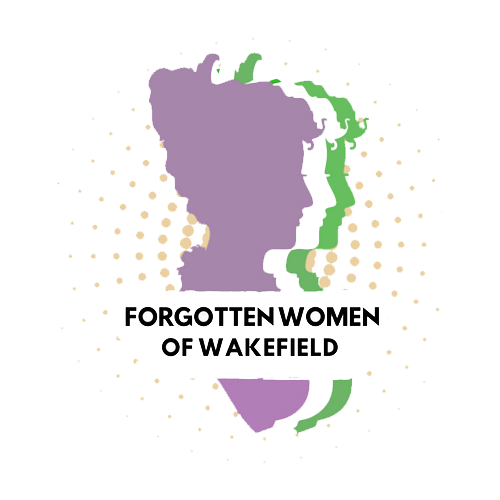Nationally less than 13 percent of women are represented on Blue Plaques. In Wakefield there are currently only five Blue Plaques dedicated to women against 45 to men or buildings. Ultimately this makes it harder for women to be seen as having contributed to the public life of our city and normalises the concept that women are not as important as men.
Dream Time Creative has pledged Blue Plaque Parity by 2028, which will be 100 years after ALL women got the vote. Once we achieve this we will be the only city in the UK to have honoured the women from our past in this way, women who have directly influenced the social, political and cultural landscape of Wakefield.
Women’s achievements are easily forgotten or written out. All too often they are defined by the men around them, and with their successes belittled they often end up as a footnote in a male’s version of events. Our project is uncovering the stories of the women who made their own way, who made their own decisions and who, as a result, made a tremendous difference to our society.
Women like Edith Mackie, without whom the green spaces in Wakefield we know and love, would not exist. Neither would St. John’s Church, nor the square. Thousands of children would not have received the care they did in Clayton Hospital, and Wakefield would not have been known, nationally, as a centre of medical excellence in the training of nurses.
Women like Louisa Fennell, whose art work was exhibited in the highest levels of society and whose Wakefield Scenes delight historians and painters alike.
Women like Florence Beaumont who, in 1913, led over 6000 people through out streets on a march down to London to petition for women’s suffrage. Florence went on to represent every single women’s suffrage organisation at The League of Nations in her role as Hon. Secretary.
Women like Ellen and Margaret Gissing, without whom hundreds of boys would not have had access to any form of education and who introduced football, for the first time ever in Wakefield, to the curriculum.
Women like Gertrude McCroben, the second headmistress of WGHS who introduced physical education to the curriculum for the first time in history, raised aspirations for both girls and the parents of girls when she introduced a broad, arts based education and enabled them to pursue careers outside of the home. Gertrude, Florence, Edith and the Gissing’s all supported the war effort and raised thousands of pounds to support families both here and in Belgium. Indeed, in her role as Headmistress of the girls’ school, Miss McCroben raised enough money to buy, kit out and send an ambulance to the Belgium front.
Then of course there is Baroness Alice Martha Bacon, the first female MP elected in 1945 and whose reforms included the abolition of the death penalty, decriminalization of abortion, decriminalization of homosexuality and the introduction of comprehensive education for all.
All these women were extraordinary and they are just the tip of the iceberg. Wakefield produced some of the most active, passionate trailblazers in social reform, education, health and culture in the UK during the 18th, 19th & 20th centuries and it is those women we will be honouring as part of the Blue Plaque Scheme over the next 10 years.
This is not to forget the memories, achievements and accomplishments of ordinary women in Wakefield. We have a further strand to our project — no less important than the first — which is designed to engage and honour the women who, within living memory, also helped to shape our communities. We work with local schools, community groups, in the field of mental health, in writing groups, in dementia groups, with local artists and poets and provide opportunities for people to come together to share those stories and honour their women both on small blue plaques and in other forms of creativity which we will be continuing to share, creatively with the wider community over the next 10 years.
Every project we undertake is underpinned by creativity of all kinds. Creativity provides a pathway into cultural engagement and it is this vision which is enabling people from across all areas of our region to engage with, learn from and be inspired by our Forgotten Women. This passion and sense of purpose is what will ultimately drive this project beyond 2028 when it will be normal for our citizens to know about and speak with pride, not only about the women from our past but women in our present. It will give people a reason to stay and invest in our city, and, with the support of organisations such as Wakefield University, The Art House, The Theatre, The Black Horse Poets, Wakefield Soroptimists, St John’s Church, The Girls High School, Wakefield Library and Museum and The Wakefield Civic Society this first phase of the project is embedding that concept beautifully.
It is fitting to leave the final words to our Forgotten Women.
[ctt template=”8″ link=”D9dzv” via=”yes” ]Louisa Fennell’s last entry in her diary reads, ‘Never put off until tomorrow what you can do today.’[/ctt]
[ctt template=”8″ link=”f1c0a” via=”no” ]Edith Mackie was well known for saying, ‘Deeds Not Words’.[/ctt]
[ctt template=”8″ link=”cd1d1″ via=”yes” ]Ellen and Margaret Gissing demonstrated a tenacity and determination which highlights their motto ‘It can be done, and it shall be done’.[/ctt]
[ctt template=”8″ link=”Qc1fG” via=”yes” ]Florence Beaumont is remembered well by her family for saying, ‘I shall not bow to convention if that convention is based on unkindness or stupidity’.[/ctt]
[ctt template=”8″ link=”Vf9N1″ via=”yes” ]Alice Bacon’s speeches to the Houses of Parliament often refer to the importance of collaboration: ‘We will work together to make things better’.[/ctt]
[ctt template=”8″ link=”dS5HY” via=”yes” ]Gertrude McCroben’s words, written in a Christmas card to her pupils, said: ‘Better not be at all, than not be noble’.[/ctt]

